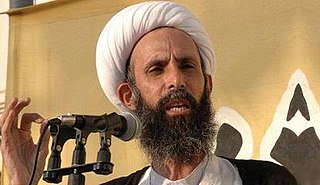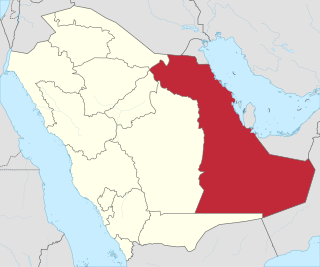Qatif or Al-Qatif is a governorate and urban area located in Eastern Province, Saudi Arabia. It extends from Ras Tanura and Jubail in the north to Dammam in the south, and from the Persian Gulf in the east to King Fahd International Airport in the west. This region has its own municipality and includes the Qatif downtown, Safwa, Saihat, Tarout Island, and many other smaller cities and towns.
The Saudi government does not conduct a census on religion or ethnicity, but some sources estimate the Shia population in Saudi Arabia to make up around 20% of the approximately 34 million natives of Saudi Arabia.
Al-Awamiyah, also spelled Awamia, is a town situated in the Al-Qatif region in the Eastern Province of Saudi Arabia. As of 2009, it has a population of about 25,500 people. Al-Awamiyah is bordered by the Al-Ramis farms to the east and some other farms to the west and the south. To the north side, there is a dividing line between Al-Awamiyah and the neighboring Safwa city, so the town cannot expand any more and provide housing land for its growing population. Due to this limited land, the people move out of the town and settle in nearby neighborhoods, notably Al-Nasera which is home to almost 2500 people living in 250 homes.

The 2011Bahraini uprising was a series of anti-government protests in Bahrain led by the Shia-dominant and some Sunni minority Bahraini opposition from 2011 until 2014. The protests were inspired by the unrest of the 2011 Arab Spring and protests in Tunisia and Egypt and escalated to daily clashes after the Bahraini government repressed the revolt with the support of the Gulf Cooperation Council and Peninsula Shield Force. The Bahraini protests were a series of demonstrations, amounting to a sustained campaign of non-violent civil disobedience and some violent resistance in the Persian Gulf country of Bahrain. As part of the revolutionary wave of protests in the Middle East and North Africa following the self-immolation of Mohamed Bouazizi in Tunisia, the Bahraini protests were initially aimed at achieving greater political freedom and equality for the 70% Shia population.

The protests in Saudi Arabia were part of the Arab Spring that started with the 2011 Tunisian revolution. Protests started with a self-immolation in Samtah and Jeddah street protests in late January 2011. Protests against anti-Shia discrimination followed in February and early March in Qatif, Hofuf, al-Awamiyah, and Riyadh. A Facebook organiser of a planned 11 March "Day of Rage", Faisal Ahmed Abdul-Ahad, was allegedly killed by Saudi security forces on 2 March, with several hundred people protesting in Qatif, Hofuf and al-Amawiyah on the day itself. Khaled al-Johani demonstrated alone in Riyadh, was interviewed by BBC Arabic Television, was detained in ʽUlaysha Prison, and became known online as "the only brave man in Saudi Arabia". Many protests over human rights took place in April 2011 in front of government ministry buildings in Riyadh, Ta'if and Tabuk and in January 2012 in Riyadh. In 2011, Nimr al-Nimr encouraged his supporters in nonviolent resistance.
The Human Rights First Society is a non-governmental and non-profit organisation which seeks to promote human rights in the Kingdom of Saudi Arabia. It is one of the few independent groups in Saudi Arabia monitoring human rights, along with the Saudi Civil and Political Rights Association, the Society for Development and Change and the Association for the Protection and Defense of Women's Rights in Saudi Arabia. The HRFS was initiated as an organisation dedicated to protecting and defending human rights in Saudi Arabia according to Islamic teachings. The HRFS stands for applying the rule of law, freedoms of expression and association, and abolishing all discrimination in Saudi society on the basis of gender or religious beliefs.
Khaled al-Johani is a teacher of religious instruction in Riyadh, Saudi Arabia. He was imprisoned, without charges or trial for nearly one year, at ʽUlaysha Prison for having publicly asked for freedoms and democracy in Saudi Arabia – an absolute monarchy – during the 2011–2012 Saudi Arabian protests. His public statement was made to a BBC Arabic Television team on a street in Riyadh in the presence of security forces. On 22 February 2012 he was charged in a court for al-Qaeda suspects and a trial date set for April 2012. Al-Johani is an Amnesty International prisoner of conscience as of February 2012.
ʽUlaysha Prison is a prison in Riyadh run by the Saudi Arabian secret police agency Mabahith for arbitrary detention. During the 2011 Saudi Arabian protests, "the only brave man in Saudi Arabia", Khaled al-Johani, was held in ʽUlaysha Prison and it is suspected that several founding members of the Umma Islamic Party are being held there.

The following is a timeline of the 2011–2012 Saudi Arabian protests from May to December 2011. The 2011–2012 Saudi Arabian protests are a series of ongoing protests taking place in Saudi Arabia, which began in January 2011, influenced by concurrent protests in the region.

The following is a timeline of the 2011–2012 Saudi Arabian protests from January to June 2012. The 2011–2012 Saudi Arabian protests are a series of ongoing protests taking place in Saudi Arabia, which began in January 2011, influenced by concurrent protests in the region.

The Society for Development and Change is a Saudi Arabian human rights non-governmental organisation that became active in 2011, campaigning for equal human rights for Shia in Eastern Province, Saudi Arabia. The organisation called for a constitution and an elected legislature for Eastern Province.

Ayatollah Sheikh Nimr Baqir al-Nimr, commonly referred to as Sheikh Nimr, was a Shia sheikh from Al-Awamiyah in Saudi Arabia's Eastern Province whose arrest and execution was widely condemned, including by governments and human rights organizations.
The Specialized Criminal Court (SCC) is a non-Sharia court created in Saudi Arabia in 2008 that tries suspected terrorists and human rights activists. On 26 June 2011, the court started trials of 85 people suspected of being involved in Al-Qaeda in the Arabian Peninsula and the 2003 Riyadh compound bombings and in September 2011 another 41 al-Qaeda suspects appeared in the court. In the same year, the court held trial sessions of human rights activists, including co-founder Mohammed Saleh al-Bejadi of the Saudi Civil and Political Rights Association (ACPRA) and Mubarak Zu'air, a lawyer for long-term prisoners, and Khaled al-Johani, who spoke to BBC Arabic Television at a protest in Riyadh, thus becoming known as "the bravest man in Saudi Arabia". The court convicted 16 of the human rights activists to sentences of 5–30 years' imprisonment on 22 November 2011.

The following is a timeline of the Bahraini uprising from February to March 2011, beginning with the start of protests in February 2011 and including the Saudi and Emirati-backed crackdown from 15 March.

Anti-Shi'ism is hatred of, prejudice against, discrimination against, persecution of, and violence against Shia Muslims because of their religious beliefs, traditions, and cultural heritage. The term was first used by Shia Rights Watch in 2011, but it has been used in informal research and written in scholarly articles for decades.

The following is a timeline of the 2011–2012 Saudi Arabian protests since July 2012. The 2011–2012 Saudi Arabian protests are a series of ongoing protests taking place in Saudi Arabia, which began in January 2011, influenced by concurrent protests in the region.
Dissidents have been detained as political prisoners in Saudi Arabia during the 1990s, 2000s, 2010s and 2020s. Protests and sit-ins calling for political prisoners to be released took place during the 2011–2012 Saudi Arabian protests in many cities throughout Saudi Arabia, with security forces firing live bullets in the air on 19 August 2012 at a protest at al-Ha'ir Prison. As of 2012, recent estimates of the number of political prisoners in Mabahith prisons range from a denial of any political prisoners at all by the Ministry of Interior, to 30,000 by the UK-based Islamic Human Rights Commission and the BBC.
The 2017–2020 Qatif unrest was a phase of conflict in the Qatif region of Eastern Province, Saudi Arabia, between Saudi security forces and the local Shia community, that arose sporadically starting in 1979, including a series of protests and repression during the 2011–12 Saudi Arabian protests.

The Qatif conflict is a modern phase of sectarian tensions and violence in Eastern Arabia between Arab Shia Muslims and Arab Sunni majority, which has ruled Saudi Arabia since early 20th century. The conflict encompasses civil unrest which has been sporadically happened since the 1979 uprising, pro-democracy and pro-human rights protests and occasional armed incidents, which increased in 2017 as part of the 2017–20 Qatif unrest.







